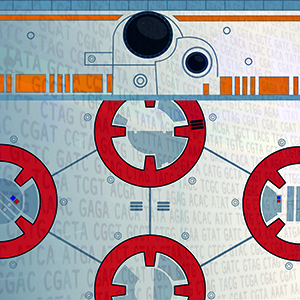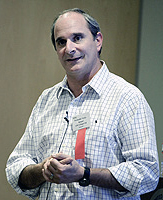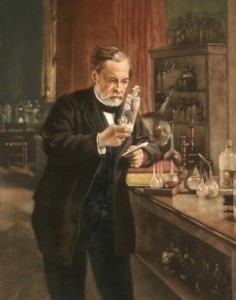 R2D2, short for Artoo-Detoo, is best known as the fictional robotic character in the Star Wars universe series created by George Lucas. Inducted into the Robot Hall of Fame in 2003, R2D2 has since been included in the Smithsonian Institution’s list of 101 Objects that Made America.
R2D2, short for Artoo-Detoo, is best known as the fictional robotic character in the Star Wars universe series created by George Lucas. Inducted into the Robot Hall of Fame in 2003, R2D2 has since been included in the Smithsonian Institution’s list of 101 Objects that Made America.
R2D2 is the good guy, the favorite character of George Lucas – known for always saving the day at least once in every film. However, R2d2 disses Darwin.
In the realm of biology, however, the R2d2 gene is a Darth Vader villain terrorizing Darwin’s once-popular theory. R2d2’s newly recognized function was published on February 15 in a paper in the journal Molecular Biology and Evolution by leading investigator Fernando Pardo-Manuel de Villena (pictured below), professor of genetics at the University of North Carolina School of Medicine. With a stealthy title, “R2d2 drives selfish sweeps in the house mouse,” R2d2 disses Darwin with scientific evidence.
Darwin’s Problem
Mark Derewicz, writing for the University of North Carolina, explains the problem for Darwin’s theory –
“These findings violate a key principle in biology: Darwin’s theory of natural selection.”
Villena had designed the investigation to test the validity of the selfish gene theory popularized by Darwin advocate Richard Dawkins in the 1976 book entitled The Selfish Gene while challenging Darwin’s theory of natural selection.
In the Origin of Species, Charles Darwin envisioned natural selection preserving the good and rejecting the bad –
“natural selection is daily and hourly scrutinizing, throughout the world, the slightest variations; rejecting those that are bad, preserving and adding up all that are good; silently and insensibly working, whenever and wherever opportunity offers, at the improvement of each organic being.”
“However,” as Villena explained in the Introduction to their paper, “we and others have suggested that selfish alleles [genes] strongly promote their own transmission irrespective of their effects on overall fitness.” The evidence, as expected, failed to validate Darwin’s natural selection theory of “rejecting those that are bad” theory.
The R2d2 Gene
Villena’s study, performed in collaboration with an international team of more than thirty researchers from France, Ecuador, and Australia, investigated the prevalence of the R2d2 gene in natural  and laboratory populations of the house mouse, Mus domesticus, from fourteen European countries and the United States.
and laboratory populations of the house mouse, Mus domesticus, from fourteen European countries and the United States.
R2d2, the name given to the gene investigated, stems from the characteristics of the gene – two ribosomal binding sites (r2) that are responsible for the production of the dicer-2 enzyme (d2) – not from the mind of George Lucas. While the scope of the gene function is unknown, the dicer-2 gene is known to produce the enzymes associated with the degradation of RNA.
The ScienceDaily report entitled “New research challenges Darwin, shows how a gene cheats Mendel’s law of segregation” concluded that “R2d2 is selfish. It is a true selfish gene. It propagates itself through generations but not for some evolutionary advantage. Quite the opposite.”
“[The] research,” ScienceDaily explained, “showed that some copies (alleles) of the mouse gene R2d2 can spread quickly through laboratory and wild mouse populations. This happens in spite of the fact that these R2d2 alleles cause females to have fewer offspring… [and] marks the first time scientists have used laboratory and natural populations of mice to show that a selfish gene can become fixed in a population of organisms while at the same time being detrimental to ‘reproductive fitness.’”
“The ‘selfish sweep’ at R2d2 looks just like a typical selective sweep but has nothing to do with adaptation,” said Villena. “We know very little about the relative importance of selfish and adaptive sweeps in evolution.”
Beyond R2d2
R2d2, however, is not the first gene dissing Darwin. Common damaging genetic changes in humans that have failed Darwin’s natural selection theory include familial hypercholesterolemia, polycystic kidney disease, sickle cell anemia, cystic fibrosis, and Tay-Sachs Disease. According to WIKIPEDIA, over 4,000 human diseases are the result of “bad” genetics untouched by Darwin’s theory of natural selection. R2d2 is just the latest example.
R2d2 disses Darwin along with most evolution advocates. To address these glaring problems, the Royal Society is convening leading evolution scientists this November entitled “New trends in evolutionary biology: biological, philosophical and social science perspectives.” The reason for the meeting stems from the recognition that –
“Developments in evolutionary biology [e.g., R2d2] and adjacent fields have produced calls for revision of the standard theory of evolution, although the issues involved remain hotly contested. This meeting will present these developments and arguments in a form that will encourage cross-disciplinary discussion.”
R2d2 disses Darwin – no surprise. As more investigations are performed, evidence from the Genomic Revolution is now expected to further undermine Darwin’s tattered theory and present an even higher validation level for any new emerging theory for biological evolution. The evolution industry increasingly finds itself in an essentially indefensible state based on scientific evidence.
Darwin’s dilemma intensifies.
 Genesis
Genesis
In the words of Louis Pasteur (1822–1895), founder of microbiology, during the Scientific Revolution noted that what was relevant in the nineteenth century is still relevant in the twenty-first century –
“A bit of science distances one from God, but much science nears one to Him… The more I study nature, the more I stand amazed at the work of the Creator.”
Ironically, evidence produced by the evolution industry continues to discover evidence compatible with the Genesis account written by Moses – “kind after kind.”
Refer to the Glossary for the definition of terms and to Understanding Evolution to gain insights into understanding evolution.

 Genesis
Genesis